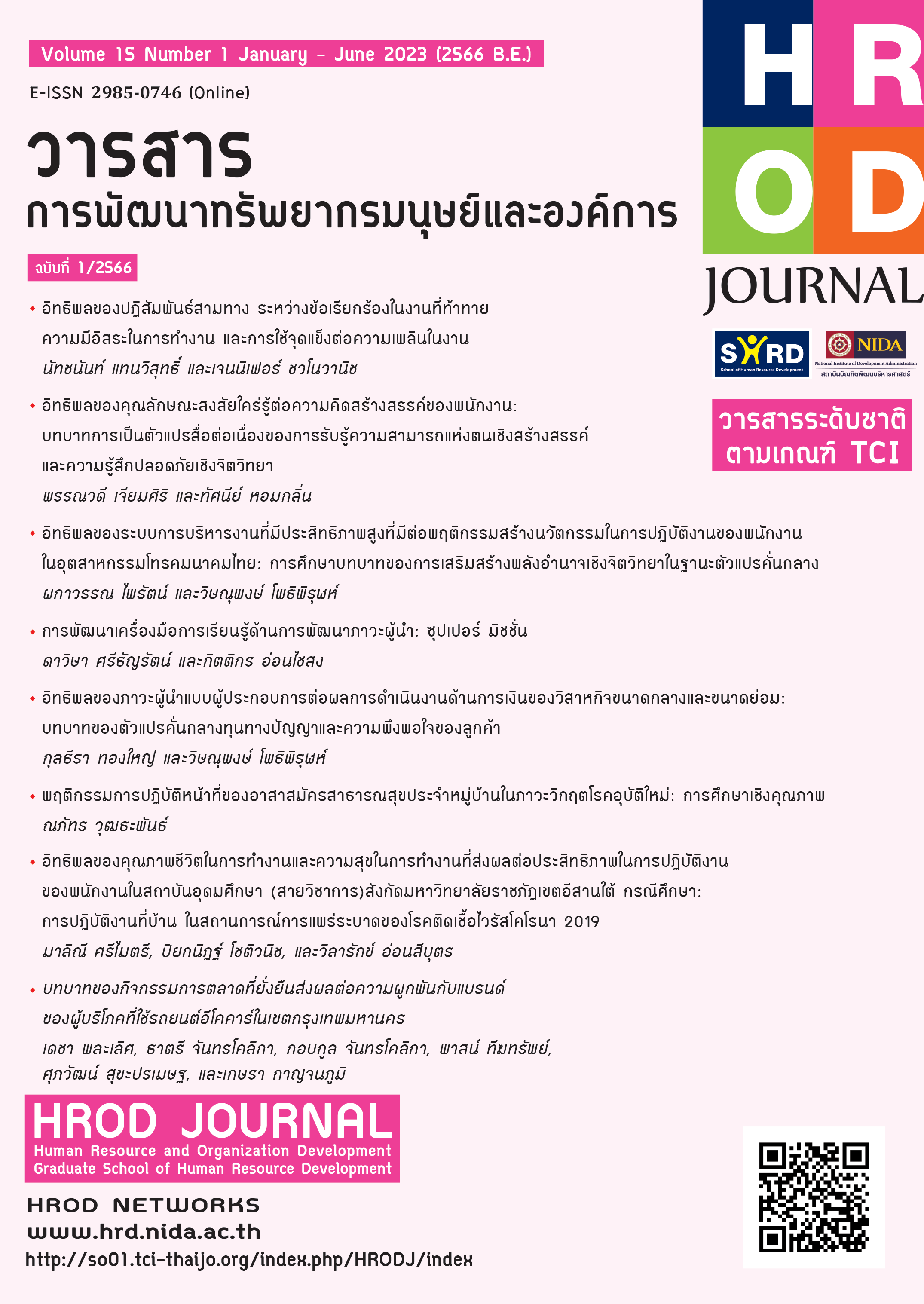Working Behavior of Village Health Volunteers during New Emerging Disease: A Qualitative Study
Main Article Content
Abstract
This qualitative research aims to study a work behavior of Thai village health volunteers during the emerging disease by 10 in-depth interview of Thai village health volunteers. A content analysis was implemented by text analysis, coding, themes and sub-themes then using the member checking, and triangulation technique were conducted to confirm the findings. The findings revealed that there were 5 components of village health volunteers’ work behavior during crisis which are willingness, assurance, sympathy, reliability, and impersonal to work. Furthermore, the factors that affect the work behavior consists of 3 mains factors which are hardiness personality and spiritual belief, work environment, and social factors which are emotional intelligent and psychological capital. This study will contribute to the knowledge and understanding not only the policy maker at all level but also the community to initiate the supportive program of the next crisis in order to create the mental strength as well as the hard and spiritual personality including the psychological capital to promote the mental growth and well-being.
Article Details

This work is licensed under a Creative Commons Attribution-NonCommercial-NoDerivatives 4.0 International License.
1) The content of article in HROD journal is the author’s wholly responsibility to research, analyze, summarize, compile, and reference data. The editorial department will not be responsible in anyway.
2) The submitted articles in HROD journal must be unpublished before and must not be currently under consideration for publication elsewhere. If it is detected for its repetition, the author must be responsible for infringement of copyright.
3) Authors will be asked to transfer copyright of the article to the Publisher. The article is prohibited to reproduce all or part of the text, unless allowed.
References
จิตติมาพันธ์ ณ เชียงใหม่. (2546). การสนับสนุนทางสังคมกับการปรับตัวของเด็กกำพร้า ที่พ่อแม่เสียชีวิตด้วยโรคเอดส์ [วิทยานิพนธ์ปริญญามหาบัณฑิต ไม่ได้ตีพิมพ์]. มหาวิทยาลัยเชียงใหม่.
ชนุกร แก้วมณี. (2562). แนวคิดและวิธีการประเมินความต้องการด้านจิตวิญญาณของผู้ป่วยมะเร็ง. Nursing Journal of the Ministry of Public Health, 29(1), 1-14.
ณัฐวุฒิ อรินทร์. (2555). ปัจจัยเชิงเหตุและผลของทุนทางจิตวิทยาเชิงบวกที่มีต่อสุขภาวะทางจิตและพฤติกรรมการปฏิบัติงาน ภายใต้สถานการณ์ความไม่สงบของบุคลากรสาธารณสุขในจังหวัดชายแดนใต้ [วิทยานิพนธ์ปริญญาดุษฎีบัณฑิต ไม่ได้ตีพิมพ์]. มหาวิทยาลัยศรีนครินทรวิโรฒ.
พงษ์มาศ ทองเจือ (2559). อิทธิพลของลักษณะนิสัยแบบฟื้นคืนพลังและสุขภาวะทางจิตวิญญาณที่มีต่อปัญหาด้านจิตใจในบุคคลวัยกลางคน [วิทยานิพนธ์ปริญญามหาบัณฑิต ไม่ได้ตีพิมพ์]. จุฬาลงกรณ์มหาวิทยาลัย.
ไพศาล แย้มวงษ์. (2555). การศึกษาการสนับสนุนทางสังคมที่ส่งผลต่อความพึงพอใจในชีวิตของนักศึกษามหาวิทยาลัยธรรมศาสตร์ [การศึกษาค้นคว้าอิสระปริญญามหาบัณฑิต ไม่ได้ตีพิมพ์]. มหาวิทยาลัยศรีนครินทรวิโรฒ.
ศิวพร โปรยานนท์. (2552). พฤติกรรมของผู้นำและสภาพแวดล้อมการทำงานที่ส่งผลต่อความสร้างสรรค์ในงานของบุคลากร: กรณีศึกษาองค์การธุรกิจไทยที่มีนวัตกรรมยอดเยี่ยมปี 2552 [วิทยานิพนธ์ปริญญามหาบัณฑิต ไม่ได้ตีพิมพ์]. สถาบันบัณฑิตพัฒนบริหารศาสตร์.
ศูนย์บริหารสถานการณ์แพร่ระบาดของโรคติดเชื้อไวรัสโคโรนา 2019. (2564). เข้าถึงจาก https://www.moicovid.com/
Beals, K. P., Peplau, L. A., & Gable, S. L. (2009). Stigma management and well-being: The role of perceived social support, emotional processing and suppression. Pers Soc Psychol Bull, 35(7), 867-879. https://doi.org/10.1177/0146167209334783
Bertera, E. M. (2005). Mental health in US adults: The role of positive social support and social negativity in personal relationships. Journal of Social and Personal Relationships, 22(1), 33-48.
Brooks, S. K., Webster, R. K., Smith, L. E., Woodland, L., Wessely, S., Greenberg, N., & Rubin, G. J. (2020). The psychological impact of quarantine and how to reduce it: Rapid review of the evidence. The lancet, 395(10227), 912-920.
Cao, W., Fang, Z., Hou, G., Han, M., Xu, X., Dong, J., et al. (2020). The psychological impact of the COVID-19 epidemic on college students in China. Psychiatry Research, 287(112934). https://doi.org/10.1016/j.psychres.2020.112934
Centers for Disease Control and Prevention. (2022). Health care access, telemedicine, and mental health. Retrieved from https://www.cdc.gov/nchs/covid19/health-care-access-and-mental-health.htm
Fredrickson, B. L. (2013). Updated thinking on positivity ratios. American Psychologist, 68(9), 814–822. https://doi.org/10.1037/a0033584
Glover-Graf, N., Marini, I., Baker, J., & Buck, T. (2007). Religious and spiritual beliefs and practices of persons with chronic pain. Rehabilitation Counseling Bulletin, 51, 21–33. https://doi.org/10.1177/00343552070510010501
Kawohl, W., & Nordt, C. (2020). COVID-19, unemployment, and suicide. Lancet Psych. 7, 389–390. https://doi.org/10.1016/s2215-0366(20)30141-3
King, G., Willoughby, C., Specht, J. A.., & Brown, E. (2006). Social support process and the adaptation of individuals with chronic disabilities. Qualitative Health Research, 16(7), 902– 925.
Kobasa, S. C. (1979). Stressful life events, personality, and health: An inquiry into hardiness. Journal of Personality and Social Psychology, 37(1), 1–11. https://doi.org/10.1037/ 0022-3514.37.1.1
Li, L. Z., & Wang, S. (2020). Prevalence and predictors of general psychiatric disorders and loneliness during COVID-19 in the United Kingdom. Psych. Res. 291, 0165–1781. https://doi.org/10.1016/j.psychres.2020.113267
Li, W., Zhang, J., Xiao, S., & Sun, L. (2020). Characteristics of deaths amongst health workers in China during the outbreak of COVID-19 infection. Journal of Infection, 81(1), 147-178.
Luthans, F., Vogelgesang, G. R., & Lester, P. B. (2006). Developing the psychological capital of resiliency. Human Resource Development Review, 5(1), 25-44.
Panchal, N., Kamal, R., Cox, C., & Garfield, R. (2021). The Implications of COVID-19 for Mental Health and Substance Use. KFF Health Tracking Poll, 2021. Retrieved April 12, 2021, from https://www.kff.org/coronavirus-covid-19/issue-brief/the-implications-of-covid-19-for-mental-health-and-substance-use/
Schultz, D., & Schultz, S. E. (2006). Psychology & work today (9th ed.). Person Education.
Shigemura, J., Ursano, R. J., Morganstein, J. C., Kurosawa, M., & Benedek, D. M. (2020). Public responses to the novel 2019 coronavirus (2019‐nCoV) in Japan: Mental health consequences and target populations. Psychiatry and clinical neurosciences, 74(4), 281. https://doi.org/10.1111/pcn.12988
Smith, N., Young, A., & Lee, C. (2004). Optimism, health-related hardiness and well-being among older Australian woman. Journal of Health Psychology, 9(6), 741-752. https://doi.org/10.1177/1359105304045373
Tapp, D. M. (2004). Dilemmas of family support during cardiac recovery: Hanging as a gesture of support. Western Journal of Nursing Research, 26(5), 561-580.
Trisuriyathamma, P. (2020). Crisis wisdom. Open Wisdom.
Wang, C., Pan, R., Wan, X., Tan, Y., Ku, L., Ho, C.S., & Ho, R.C. (2020). Immediate psychological responses and associated factors during the initial stage of the 2019 coronavirus disease (COVID-19) epidemic among the general population in China. International Journal Environment Reservation Public Health, 17(5), 1729-1739.


